MBA 600 Reflective Assignment: Skills and Competency Development
VerifiedAdded on 2022/12/30
|10
|2926
|1
Report
AI Summary
This reflective MBA assignment analyzes the student's learning experience within the MBA program, specifically focusing on the capstone subject and assessments. The paper details the development of essential skills, including competitive advantage through innovation and growth, leadership communication and assimilation, presentation of workplace investigations, and employability trends. The student reflects on the importance of innovation, leadership, report writing, and soft skills in a business context, highlighting personal strengths and areas for improvement. The assignment emphasizes the application of these skills and competencies in professional settings, drawing upon the workshops and materials provided throughout the MBA program. The student discusses the significance of innovation in driving business growth, effective leadership communication, data-driven reporting, and the importance of employability skills, including soft skills, in achieving professional success. The assignment also includes insights on business models, problem-solving, research methods, and data analysis, all of which are crucial for a successful management career.
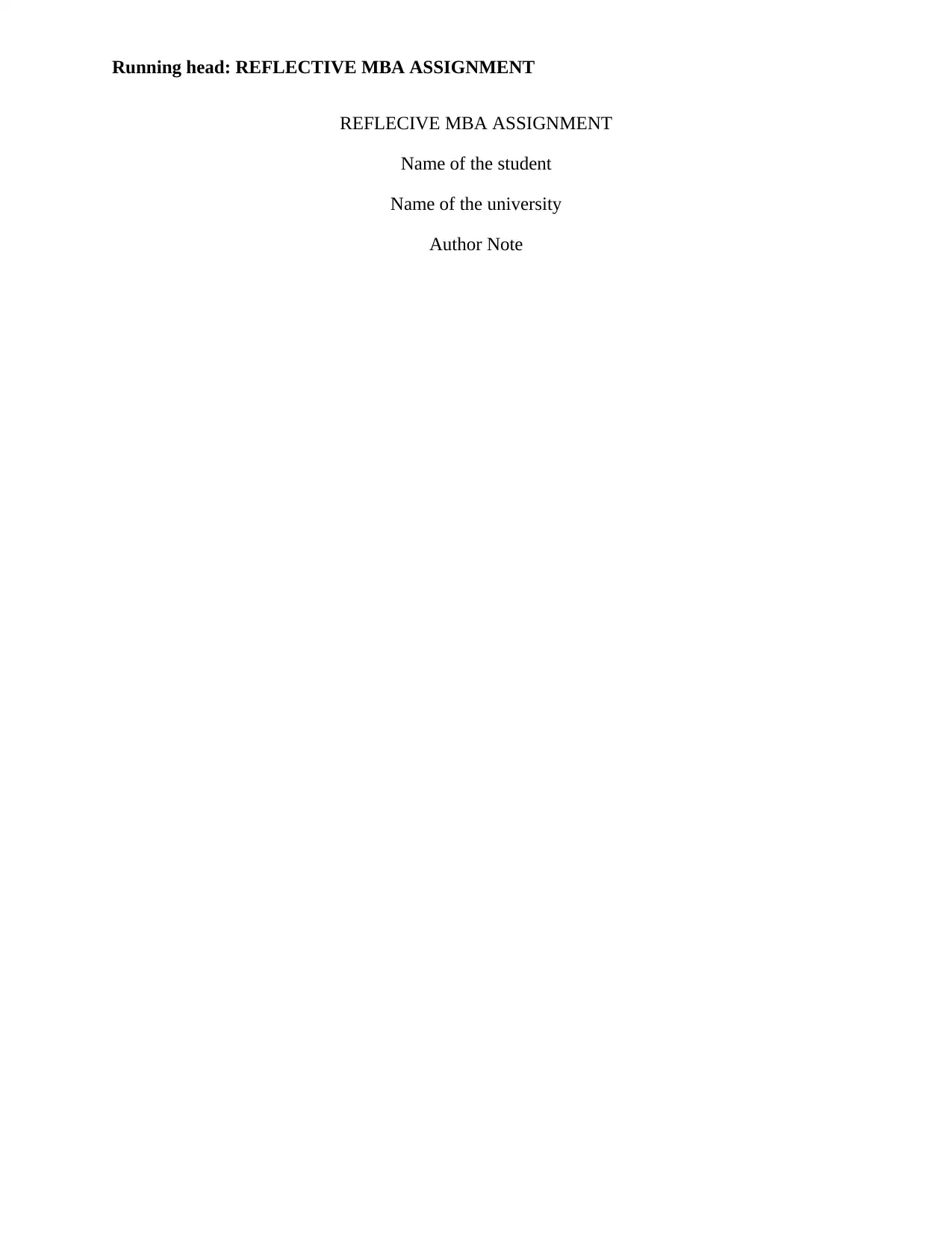
Running head: REFLECTIVE MBA ASSIGNMENT
REFLECIVE MBA ASSIGNMENT
Name of the student
Name of the university
Author Note
REFLECIVE MBA ASSIGNMENT
Name of the student
Name of the university
Author Note
Paraphrase This Document
Need a fresh take? Get an instant paraphrase of this document with our AI Paraphraser
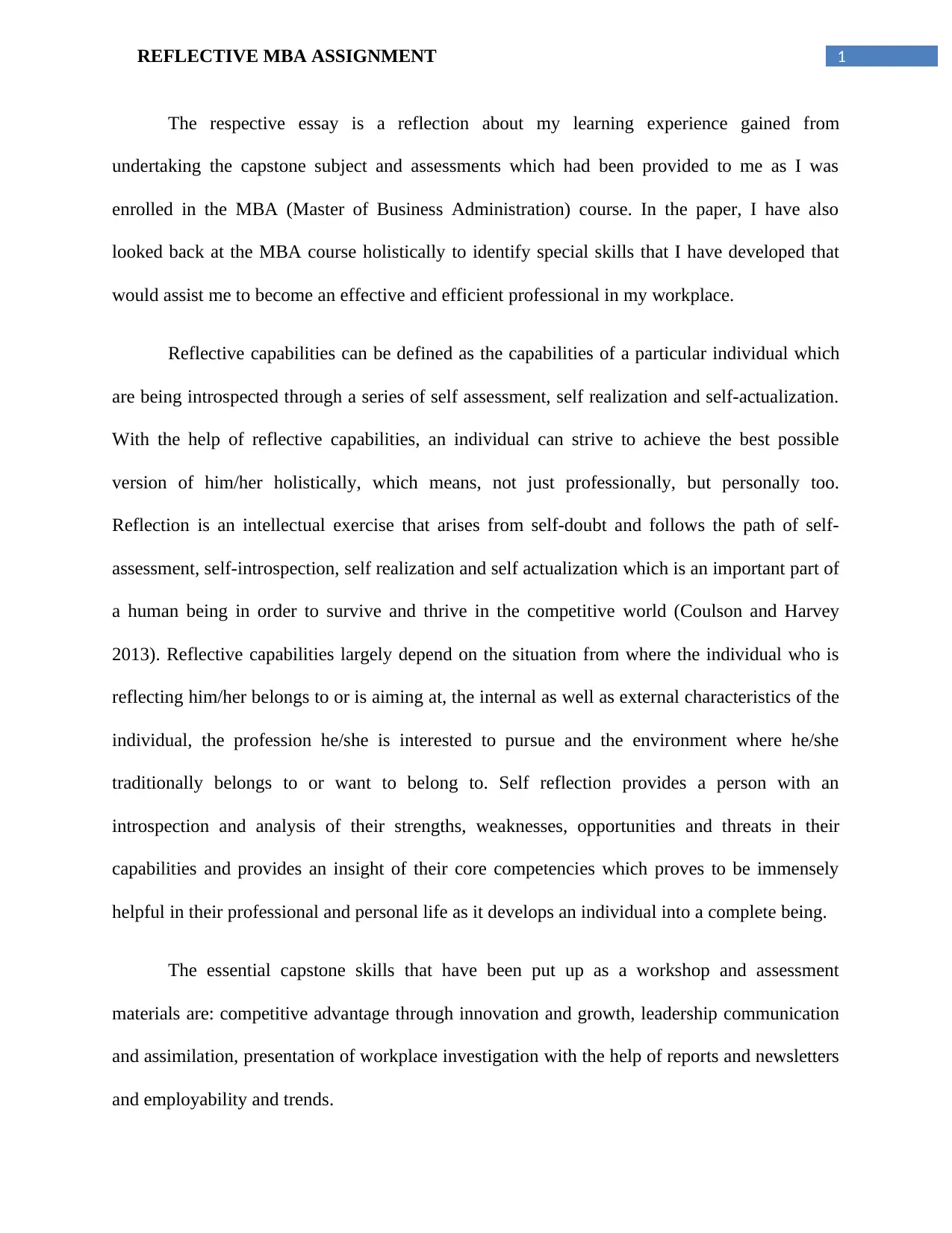
1REFLECTIVE MBA ASSIGNMENT
The respective essay is a reflection about my learning experience gained from
undertaking the capstone subject and assessments which had been provided to me as I was
enrolled in the MBA (Master of Business Administration) course. In the paper, I have also
looked back at the MBA course holistically to identify special skills that I have developed that
would assist me to become an effective and efficient professional in my workplace.
Reflective capabilities can be defined as the capabilities of a particular individual which
are being introspected through a series of self assessment, self realization and self-actualization.
With the help of reflective capabilities, an individual can strive to achieve the best possible
version of him/her holistically, which means, not just professionally, but personally too.
Reflection is an intellectual exercise that arises from self-doubt and follows the path of self-
assessment, self-introspection, self realization and self actualization which is an important part of
a human being in order to survive and thrive in the competitive world (Coulson and Harvey
2013). Reflective capabilities largely depend on the situation from where the individual who is
reflecting him/her belongs to or is aiming at, the internal as well as external characteristics of the
individual, the profession he/she is interested to pursue and the environment where he/she
traditionally belongs to or want to belong to. Self reflection provides a person with an
introspection and analysis of their strengths, weaknesses, opportunities and threats in their
capabilities and provides an insight of their core competencies which proves to be immensely
helpful in their professional and personal life as it develops an individual into a complete being.
The essential capstone skills that have been put up as a workshop and assessment
materials are: competitive advantage through innovation and growth, leadership communication
and assimilation, presentation of workplace investigation with the help of reports and newsletters
and employability and trends.
The respective essay is a reflection about my learning experience gained from
undertaking the capstone subject and assessments which had been provided to me as I was
enrolled in the MBA (Master of Business Administration) course. In the paper, I have also
looked back at the MBA course holistically to identify special skills that I have developed that
would assist me to become an effective and efficient professional in my workplace.
Reflective capabilities can be defined as the capabilities of a particular individual which
are being introspected through a series of self assessment, self realization and self-actualization.
With the help of reflective capabilities, an individual can strive to achieve the best possible
version of him/her holistically, which means, not just professionally, but personally too.
Reflection is an intellectual exercise that arises from self-doubt and follows the path of self-
assessment, self-introspection, self realization and self actualization which is an important part of
a human being in order to survive and thrive in the competitive world (Coulson and Harvey
2013). Reflective capabilities largely depend on the situation from where the individual who is
reflecting him/her belongs to or is aiming at, the internal as well as external characteristics of the
individual, the profession he/she is interested to pursue and the environment where he/she
traditionally belongs to or want to belong to. Self reflection provides a person with an
introspection and analysis of their strengths, weaknesses, opportunities and threats in their
capabilities and provides an insight of their core competencies which proves to be immensely
helpful in their professional and personal life as it develops an individual into a complete being.
The essential capstone skills that have been put up as a workshop and assessment
materials are: competitive advantage through innovation and growth, leadership communication
and assimilation, presentation of workplace investigation with the help of reports and newsletters
and employability and trends.
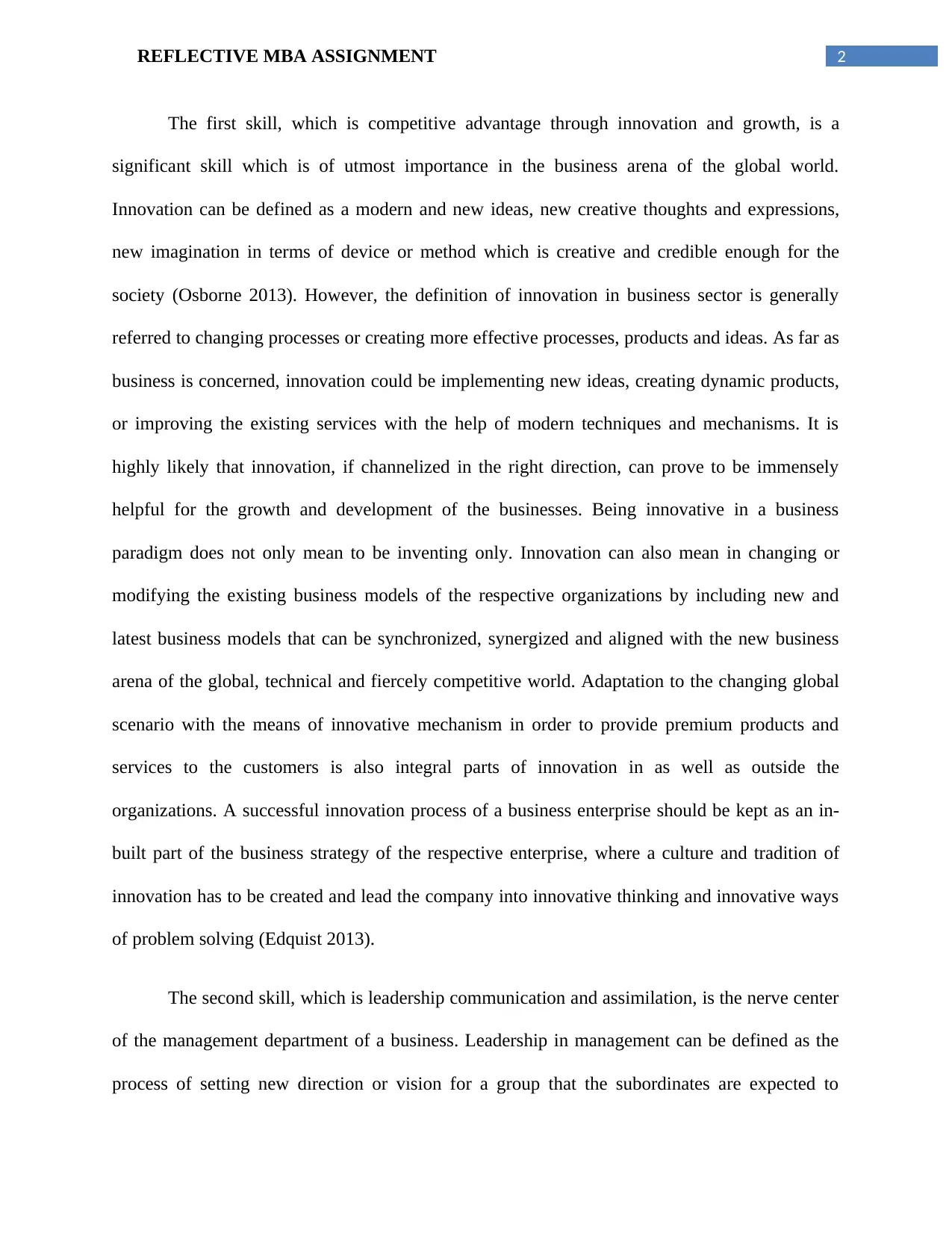
2REFLECTIVE MBA ASSIGNMENT
The first skill, which is competitive advantage through innovation and growth, is a
significant skill which is of utmost importance in the business arena of the global world.
Innovation can be defined as a modern and new ideas, new creative thoughts and expressions,
new imagination in terms of device or method which is creative and credible enough for the
society (Osborne 2013). However, the definition of innovation in business sector is generally
referred to changing processes or creating more effective processes, products and ideas. As far as
business is concerned, innovation could be implementing new ideas, creating dynamic products,
or improving the existing services with the help of modern techniques and mechanisms. It is
highly likely that innovation, if channelized in the right direction, can prove to be immensely
helpful for the growth and development of the businesses. Being innovative in a business
paradigm does not only mean to be inventing only. Innovation can also mean in changing or
modifying the existing business models of the respective organizations by including new and
latest business models that can be synchronized, synergized and aligned with the new business
arena of the global, technical and fiercely competitive world. Adaptation to the changing global
scenario with the means of innovative mechanism in order to provide premium products and
services to the customers is also integral parts of innovation in as well as outside the
organizations. A successful innovation process of a business enterprise should be kept as an in-
built part of the business strategy of the respective enterprise, where a culture and tradition of
innovation has to be created and lead the company into innovative thinking and innovative ways
of problem solving (Edquist 2013).
The second skill, which is leadership communication and assimilation, is the nerve center
of the management department of a business. Leadership in management can be defined as the
process of setting new direction or vision for a group that the subordinates are expected to
The first skill, which is competitive advantage through innovation and growth, is a
significant skill which is of utmost importance in the business arena of the global world.
Innovation can be defined as a modern and new ideas, new creative thoughts and expressions,
new imagination in terms of device or method which is creative and credible enough for the
society (Osborne 2013). However, the definition of innovation in business sector is generally
referred to changing processes or creating more effective processes, products and ideas. As far as
business is concerned, innovation could be implementing new ideas, creating dynamic products,
or improving the existing services with the help of modern techniques and mechanisms. It is
highly likely that innovation, if channelized in the right direction, can prove to be immensely
helpful for the growth and development of the businesses. Being innovative in a business
paradigm does not only mean to be inventing only. Innovation can also mean in changing or
modifying the existing business models of the respective organizations by including new and
latest business models that can be synchronized, synergized and aligned with the new business
arena of the global, technical and fiercely competitive world. Adaptation to the changing global
scenario with the means of innovative mechanism in order to provide premium products and
services to the customers is also integral parts of innovation in as well as outside the
organizations. A successful innovation process of a business enterprise should be kept as an in-
built part of the business strategy of the respective enterprise, where a culture and tradition of
innovation has to be created and lead the company into innovative thinking and innovative ways
of problem solving (Edquist 2013).
The second skill, which is leadership communication and assimilation, is the nerve center
of the management department of a business. Leadership in management can be defined as the
process of setting new direction or vision for a group that the subordinates are expected to
⊘ This is a preview!⊘
Do you want full access?
Subscribe today to unlock all pages.

Trusted by 1+ million students worldwide
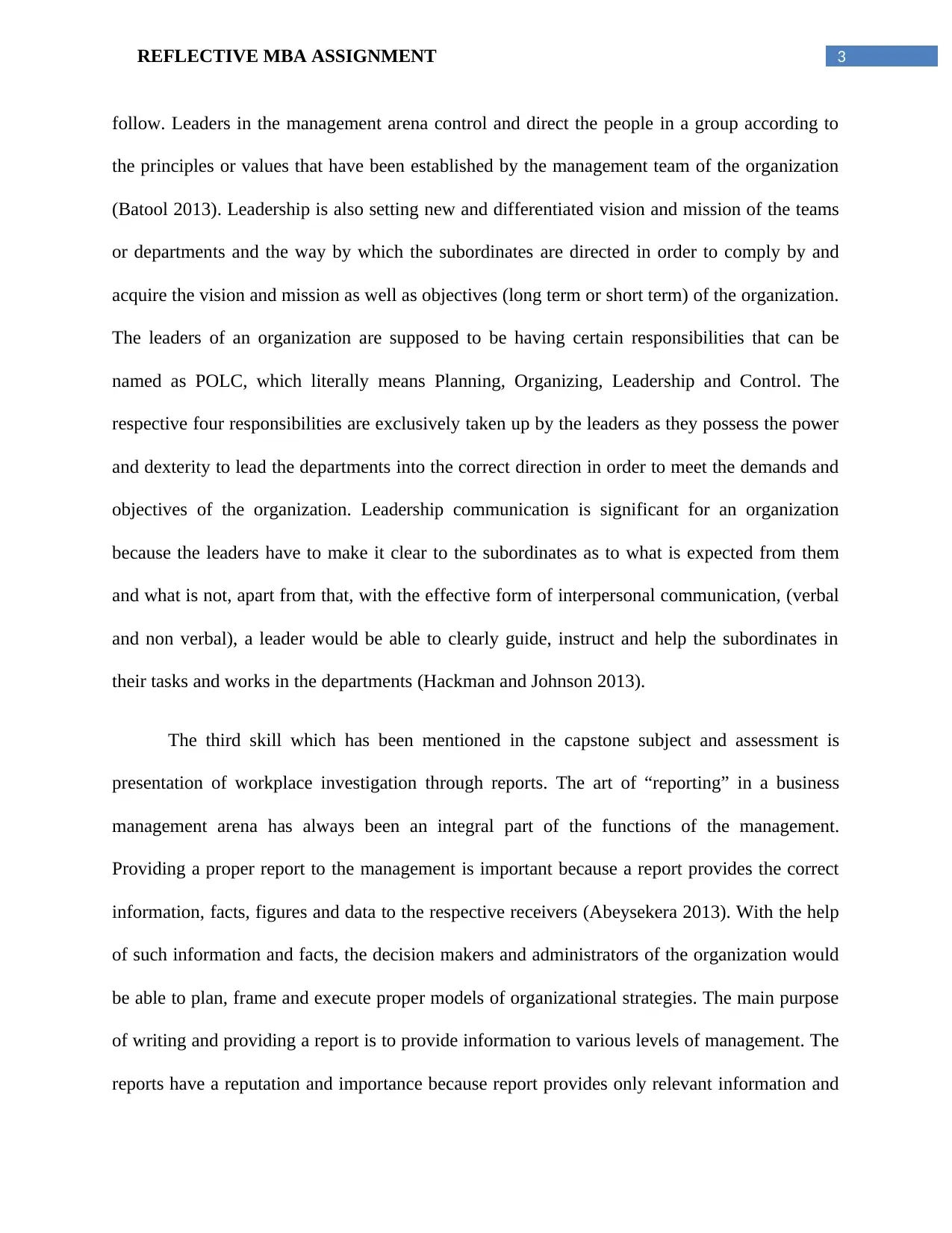
3REFLECTIVE MBA ASSIGNMENT
follow. Leaders in the management arena control and direct the people in a group according to
the principles or values that have been established by the management team of the organization
(Batool 2013). Leadership is also setting new and differentiated vision and mission of the teams
or departments and the way by which the subordinates are directed in order to comply by and
acquire the vision and mission as well as objectives (long term or short term) of the organization.
The leaders of an organization are supposed to be having certain responsibilities that can be
named as POLC, which literally means Planning, Organizing, Leadership and Control. The
respective four responsibilities are exclusively taken up by the leaders as they possess the power
and dexterity to lead the departments into the correct direction in order to meet the demands and
objectives of the organization. Leadership communication is significant for an organization
because the leaders have to make it clear to the subordinates as to what is expected from them
and what is not, apart from that, with the effective form of interpersonal communication, (verbal
and non verbal), a leader would be able to clearly guide, instruct and help the subordinates in
their tasks and works in the departments (Hackman and Johnson 2013).
The third skill which has been mentioned in the capstone subject and assessment is
presentation of workplace investigation through reports. The art of “reporting” in a business
management arena has always been an integral part of the functions of the management.
Providing a proper report to the management is important because a report provides the correct
information, facts, figures and data to the respective receivers (Abeysekera 2013). With the help
of such information and facts, the decision makers and administrators of the organization would
be able to plan, frame and execute proper models of organizational strategies. The main purpose
of writing and providing a report is to provide information to various levels of management. The
reports have a reputation and importance because report provides only relevant information and
follow. Leaders in the management arena control and direct the people in a group according to
the principles or values that have been established by the management team of the organization
(Batool 2013). Leadership is also setting new and differentiated vision and mission of the teams
or departments and the way by which the subordinates are directed in order to comply by and
acquire the vision and mission as well as objectives (long term or short term) of the organization.
The leaders of an organization are supposed to be having certain responsibilities that can be
named as POLC, which literally means Planning, Organizing, Leadership and Control. The
respective four responsibilities are exclusively taken up by the leaders as they possess the power
and dexterity to lead the departments into the correct direction in order to meet the demands and
objectives of the organization. Leadership communication is significant for an organization
because the leaders have to make it clear to the subordinates as to what is expected from them
and what is not, apart from that, with the effective form of interpersonal communication, (verbal
and non verbal), a leader would be able to clearly guide, instruct and help the subordinates in
their tasks and works in the departments (Hackman and Johnson 2013).
The third skill which has been mentioned in the capstone subject and assessment is
presentation of workplace investigation through reports. The art of “reporting” in a business
management arena has always been an integral part of the functions of the management.
Providing a proper report to the management is important because a report provides the correct
information, facts, figures and data to the respective receivers (Abeysekera 2013). With the help
of such information and facts, the decision makers and administrators of the organization would
be able to plan, frame and execute proper models of organizational strategies. The main purpose
of writing and providing a report is to provide information to various levels of management. The
reports have a reputation and importance because report provides only relevant information and
Paraphrase This Document
Need a fresh take? Get an instant paraphrase of this document with our AI Paraphraser
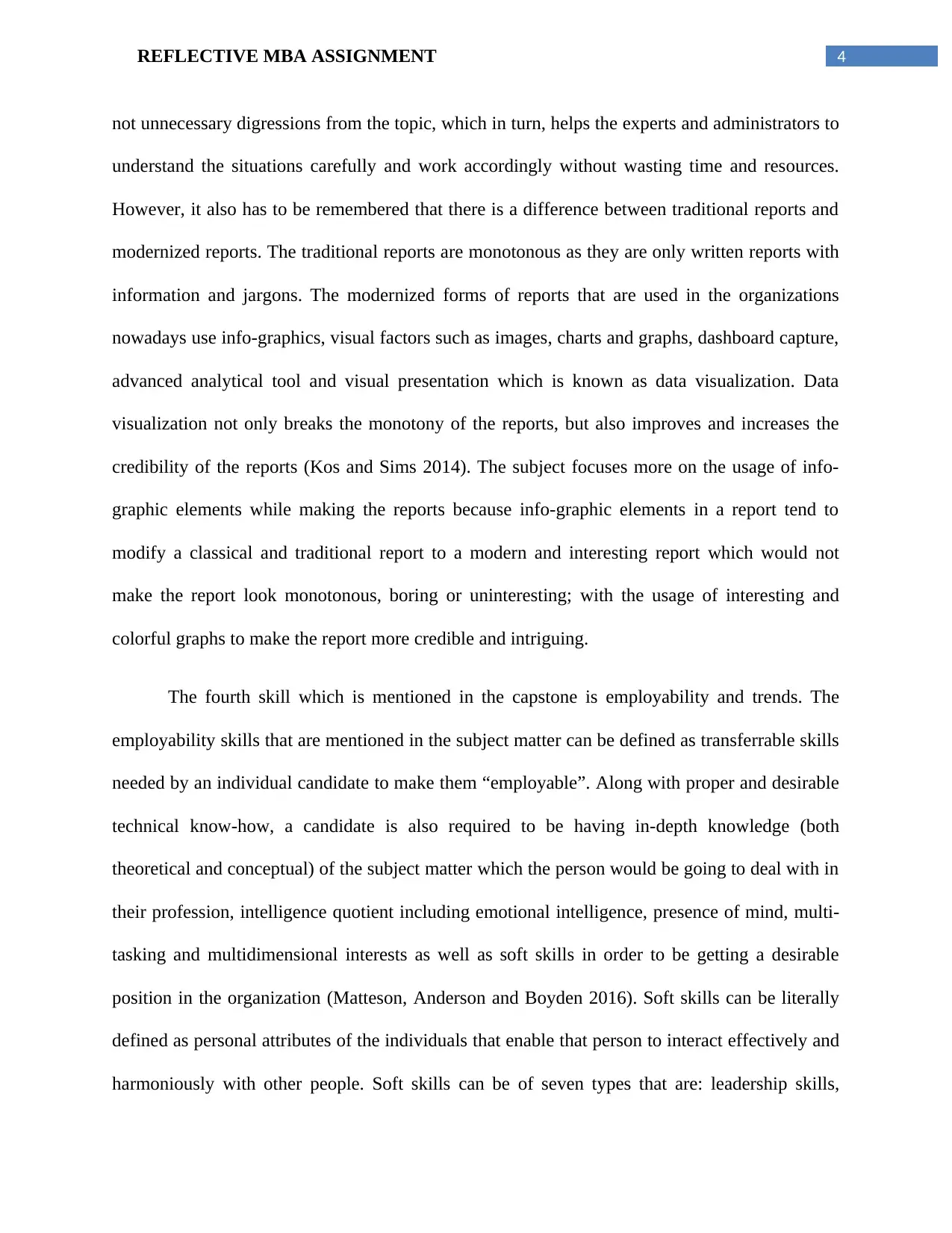
4REFLECTIVE MBA ASSIGNMENT
not unnecessary digressions from the topic, which in turn, helps the experts and administrators to
understand the situations carefully and work accordingly without wasting time and resources.
However, it also has to be remembered that there is a difference between traditional reports and
modernized reports. The traditional reports are monotonous as they are only written reports with
information and jargons. The modernized forms of reports that are used in the organizations
nowadays use info-graphics, visual factors such as images, charts and graphs, dashboard capture,
advanced analytical tool and visual presentation which is known as data visualization. Data
visualization not only breaks the monotony of the reports, but also improves and increases the
credibility of the reports (Kos and Sims 2014). The subject focuses more on the usage of info-
graphic elements while making the reports because info-graphic elements in a report tend to
modify a classical and traditional report to a modern and interesting report which would not
make the report look monotonous, boring or uninteresting; with the usage of interesting and
colorful graphs to make the report more credible and intriguing.
The fourth skill which is mentioned in the capstone is employability and trends. The
employability skills that are mentioned in the subject matter can be defined as transferrable skills
needed by an individual candidate to make them “employable”. Along with proper and desirable
technical know-how, a candidate is also required to be having in-depth knowledge (both
theoretical and conceptual) of the subject matter which the person would be going to deal with in
their profession, intelligence quotient including emotional intelligence, presence of mind, multi-
tasking and multidimensional interests as well as soft skills in order to be getting a desirable
position in the organization (Matteson, Anderson and Boyden 2016). Soft skills can be literally
defined as personal attributes of the individuals that enable that person to interact effectively and
harmoniously with other people. Soft skills can be of seven types that are: leadership skills,
not unnecessary digressions from the topic, which in turn, helps the experts and administrators to
understand the situations carefully and work accordingly without wasting time and resources.
However, it also has to be remembered that there is a difference between traditional reports and
modernized reports. The traditional reports are monotonous as they are only written reports with
information and jargons. The modernized forms of reports that are used in the organizations
nowadays use info-graphics, visual factors such as images, charts and graphs, dashboard capture,
advanced analytical tool and visual presentation which is known as data visualization. Data
visualization not only breaks the monotony of the reports, but also improves and increases the
credibility of the reports (Kos and Sims 2014). The subject focuses more on the usage of info-
graphic elements while making the reports because info-graphic elements in a report tend to
modify a classical and traditional report to a modern and interesting report which would not
make the report look monotonous, boring or uninteresting; with the usage of interesting and
colorful graphs to make the report more credible and intriguing.
The fourth skill which is mentioned in the capstone is employability and trends. The
employability skills that are mentioned in the subject matter can be defined as transferrable skills
needed by an individual candidate to make them “employable”. Along with proper and desirable
technical know-how, a candidate is also required to be having in-depth knowledge (both
theoretical and conceptual) of the subject matter which the person would be going to deal with in
their profession, intelligence quotient including emotional intelligence, presence of mind, multi-
tasking and multidimensional interests as well as soft skills in order to be getting a desirable
position in the organization (Matteson, Anderson and Boyden 2016). Soft skills can be literally
defined as personal attributes of the individuals that enable that person to interact effectively and
harmoniously with other people. Soft skills can be of seven types that are: leadership skills,
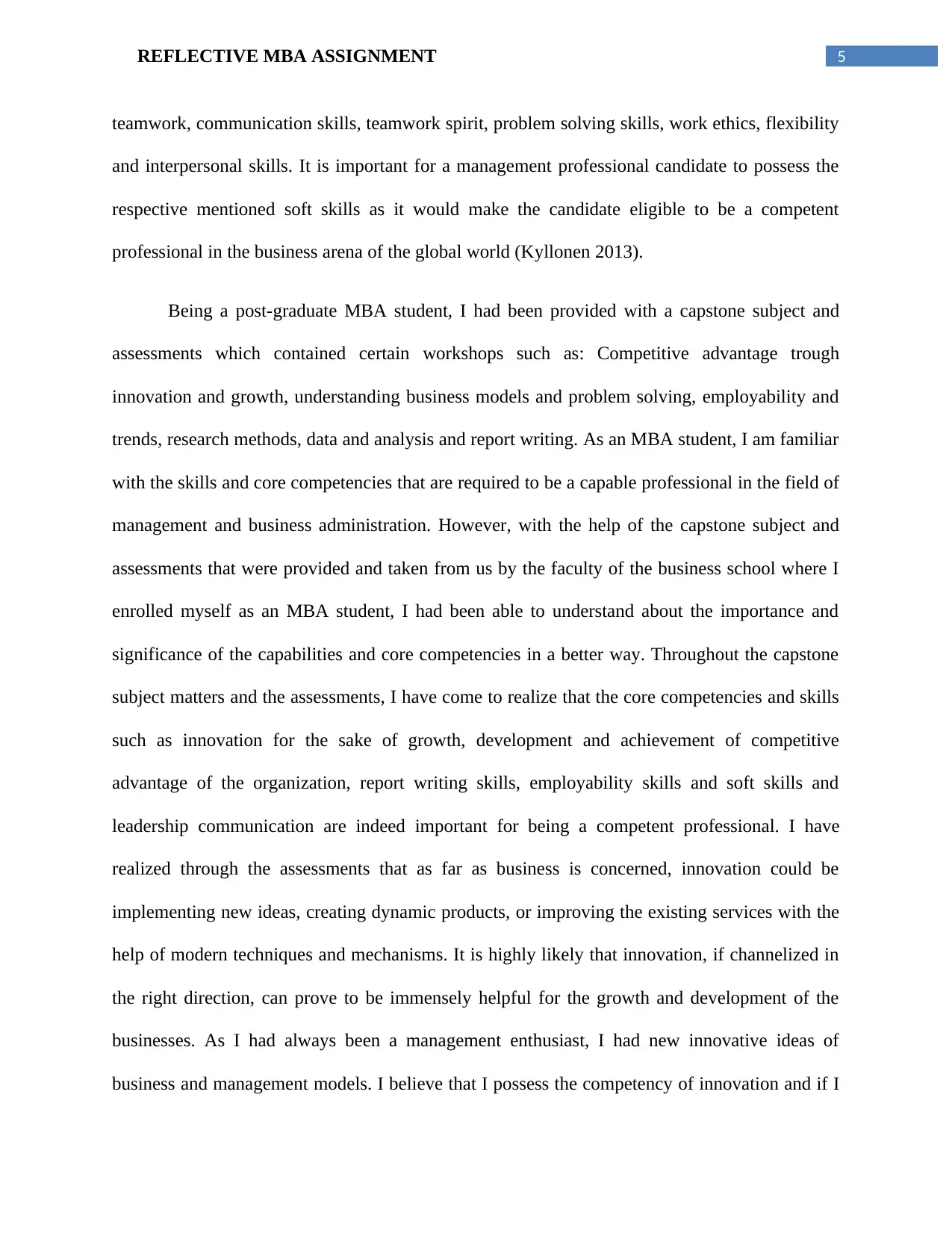
5REFLECTIVE MBA ASSIGNMENT
teamwork, communication skills, teamwork spirit, problem solving skills, work ethics, flexibility
and interpersonal skills. It is important for a management professional candidate to possess the
respective mentioned soft skills as it would make the candidate eligible to be a competent
professional in the business arena of the global world (Kyllonen 2013).
Being a post-graduate MBA student, I had been provided with a capstone subject and
assessments which contained certain workshops such as: Competitive advantage trough
innovation and growth, understanding business models and problem solving, employability and
trends, research methods, data and analysis and report writing. As an MBA student, I am familiar
with the skills and core competencies that are required to be a capable professional in the field of
management and business administration. However, with the help of the capstone subject and
assessments that were provided and taken from us by the faculty of the business school where I
enrolled myself as an MBA student, I had been able to understand about the importance and
significance of the capabilities and core competencies in a better way. Throughout the capstone
subject matters and the assessments, I have come to realize that the core competencies and skills
such as innovation for the sake of growth, development and achievement of competitive
advantage of the organization, report writing skills, employability skills and soft skills and
leadership communication are indeed important for being a competent professional. I have
realized through the assessments that as far as business is concerned, innovation could be
implementing new ideas, creating dynamic products, or improving the existing services with the
help of modern techniques and mechanisms. It is highly likely that innovation, if channelized in
the right direction, can prove to be immensely helpful for the growth and development of the
businesses. As I had always been a management enthusiast, I had new innovative ideas of
business and management models. I believe that I possess the competency of innovation and if I
teamwork, communication skills, teamwork spirit, problem solving skills, work ethics, flexibility
and interpersonal skills. It is important for a management professional candidate to possess the
respective mentioned soft skills as it would make the candidate eligible to be a competent
professional in the business arena of the global world (Kyllonen 2013).
Being a post-graduate MBA student, I had been provided with a capstone subject and
assessments which contained certain workshops such as: Competitive advantage trough
innovation and growth, understanding business models and problem solving, employability and
trends, research methods, data and analysis and report writing. As an MBA student, I am familiar
with the skills and core competencies that are required to be a capable professional in the field of
management and business administration. However, with the help of the capstone subject and
assessments that were provided and taken from us by the faculty of the business school where I
enrolled myself as an MBA student, I had been able to understand about the importance and
significance of the capabilities and core competencies in a better way. Throughout the capstone
subject matters and the assessments, I have come to realize that the core competencies and skills
such as innovation for the sake of growth, development and achievement of competitive
advantage of the organization, report writing skills, employability skills and soft skills and
leadership communication are indeed important for being a competent professional. I have
realized through the assessments that as far as business is concerned, innovation could be
implementing new ideas, creating dynamic products, or improving the existing services with the
help of modern techniques and mechanisms. It is highly likely that innovation, if channelized in
the right direction, can prove to be immensely helpful for the growth and development of the
businesses. As I had always been a management enthusiast, I had new innovative ideas of
business and management models. I believe that I possess the competency of innovation and if I
⊘ This is a preview!⊘
Do you want full access?
Subscribe today to unlock all pages.

Trusted by 1+ million students worldwide
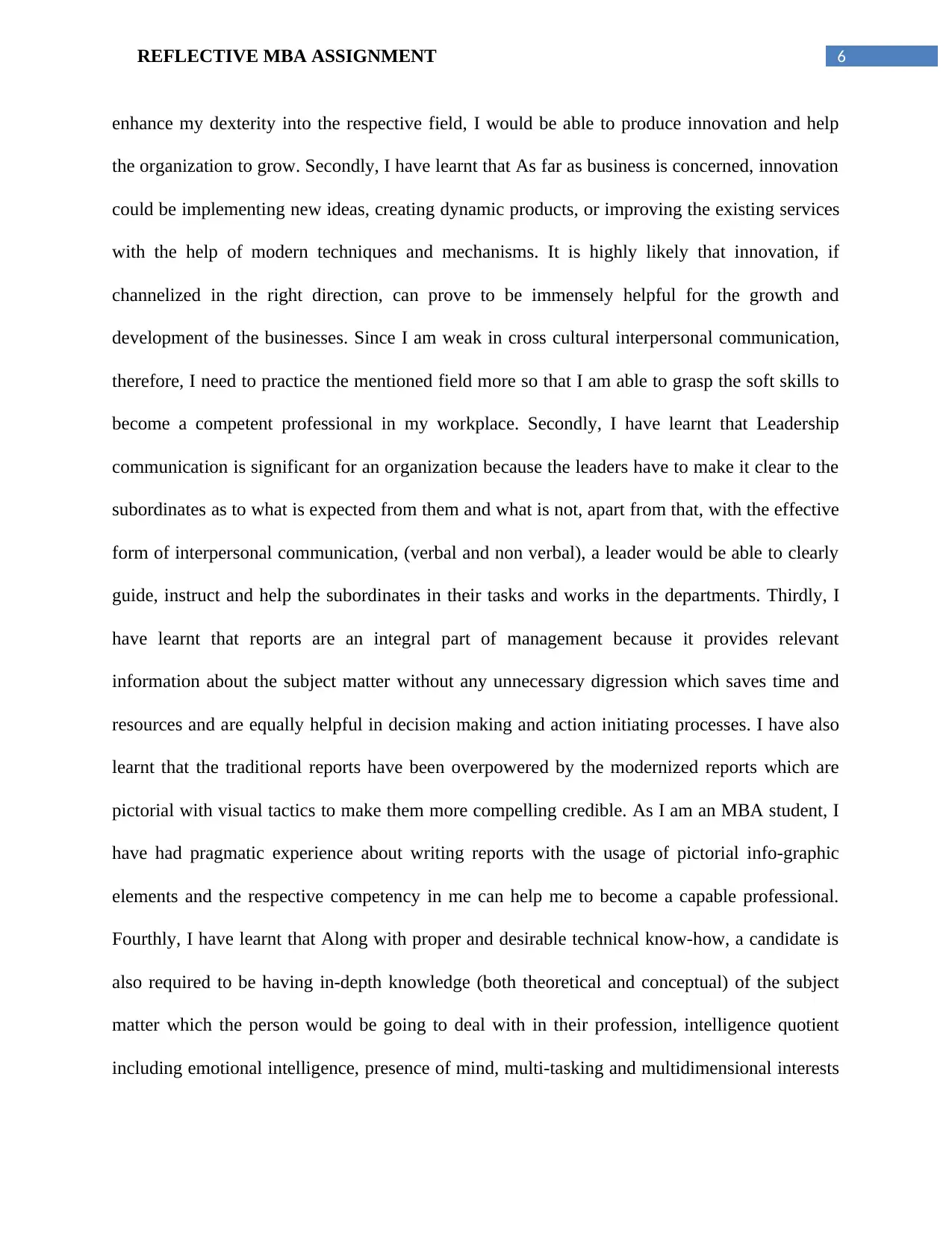
6REFLECTIVE MBA ASSIGNMENT
enhance my dexterity into the respective field, I would be able to produce innovation and help
the organization to grow. Secondly, I have learnt that As far as business is concerned, innovation
could be implementing new ideas, creating dynamic products, or improving the existing services
with the help of modern techniques and mechanisms. It is highly likely that innovation, if
channelized in the right direction, can prove to be immensely helpful for the growth and
development of the businesses. Since I am weak in cross cultural interpersonal communication,
therefore, I need to practice the mentioned field more so that I am able to grasp the soft skills to
become a competent professional in my workplace. Secondly, I have learnt that Leadership
communication is significant for an organization because the leaders have to make it clear to the
subordinates as to what is expected from them and what is not, apart from that, with the effective
form of interpersonal communication, (verbal and non verbal), a leader would be able to clearly
guide, instruct and help the subordinates in their tasks and works in the departments. Thirdly, I
have learnt that reports are an integral part of management because it provides relevant
information about the subject matter without any unnecessary digression which saves time and
resources and are equally helpful in decision making and action initiating processes. I have also
learnt that the traditional reports have been overpowered by the modernized reports which are
pictorial with visual tactics to make them more compelling credible. As I am an MBA student, I
have had pragmatic experience about writing reports with the usage of pictorial info-graphic
elements and the respective competency in me can help me to become a capable professional.
Fourthly, I have learnt that Along with proper and desirable technical know-how, a candidate is
also required to be having in-depth knowledge (both theoretical and conceptual) of the subject
matter which the person would be going to deal with in their profession, intelligence quotient
including emotional intelligence, presence of mind, multi-tasking and multidimensional interests
enhance my dexterity into the respective field, I would be able to produce innovation and help
the organization to grow. Secondly, I have learnt that As far as business is concerned, innovation
could be implementing new ideas, creating dynamic products, or improving the existing services
with the help of modern techniques and mechanisms. It is highly likely that innovation, if
channelized in the right direction, can prove to be immensely helpful for the growth and
development of the businesses. Since I am weak in cross cultural interpersonal communication,
therefore, I need to practice the mentioned field more so that I am able to grasp the soft skills to
become a competent professional in my workplace. Secondly, I have learnt that Leadership
communication is significant for an organization because the leaders have to make it clear to the
subordinates as to what is expected from them and what is not, apart from that, with the effective
form of interpersonal communication, (verbal and non verbal), a leader would be able to clearly
guide, instruct and help the subordinates in their tasks and works in the departments. Thirdly, I
have learnt that reports are an integral part of management because it provides relevant
information about the subject matter without any unnecessary digression which saves time and
resources and are equally helpful in decision making and action initiating processes. I have also
learnt that the traditional reports have been overpowered by the modernized reports which are
pictorial with visual tactics to make them more compelling credible. As I am an MBA student, I
have had pragmatic experience about writing reports with the usage of pictorial info-graphic
elements and the respective competency in me can help me to become a capable professional.
Fourthly, I have learnt that Along with proper and desirable technical know-how, a candidate is
also required to be having in-depth knowledge (both theoretical and conceptual) of the subject
matter which the person would be going to deal with in their profession, intelligence quotient
including emotional intelligence, presence of mind, multi-tasking and multidimensional interests
Paraphrase This Document
Need a fresh take? Get an instant paraphrase of this document with our AI Paraphraser
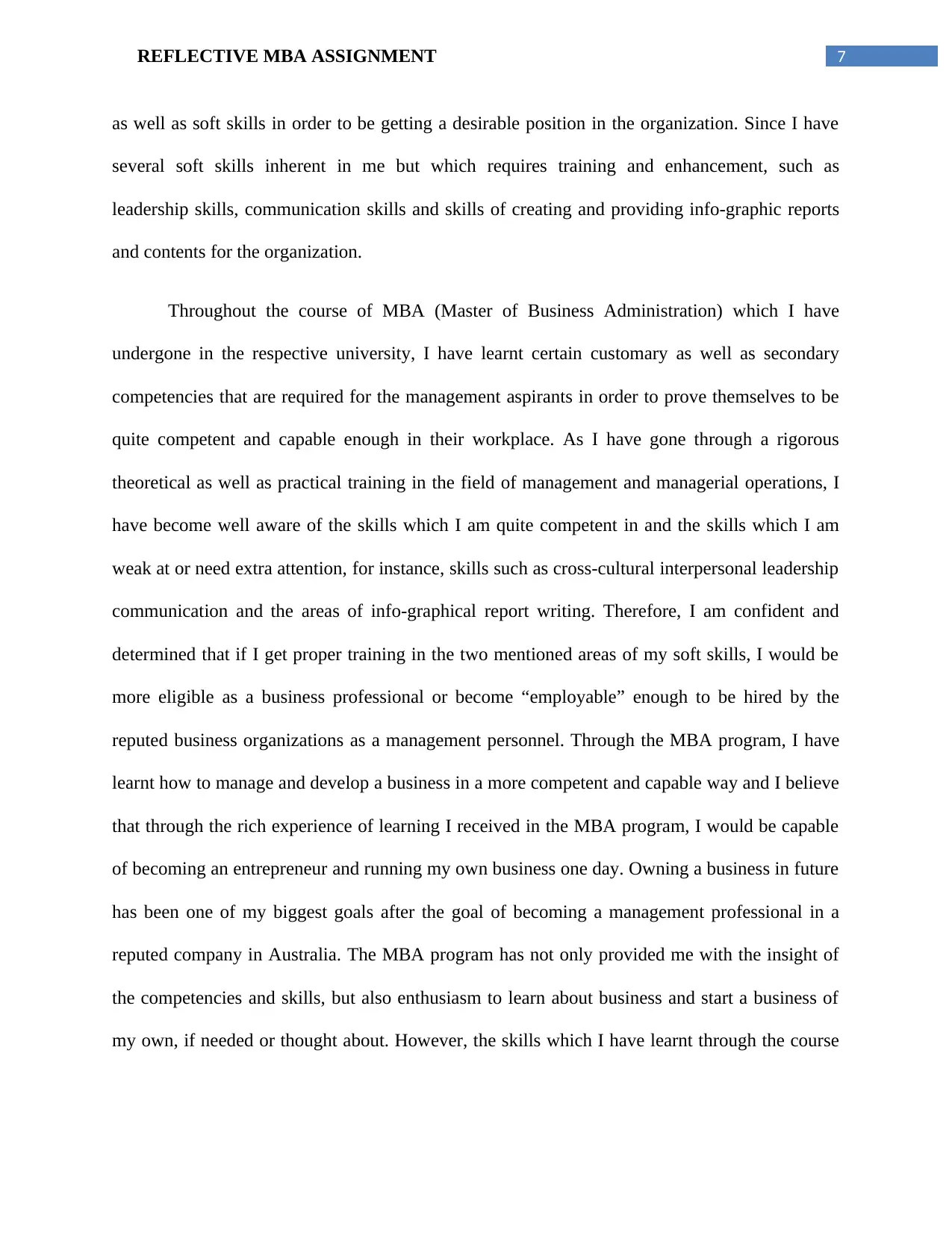
7REFLECTIVE MBA ASSIGNMENT
as well as soft skills in order to be getting a desirable position in the organization. Since I have
several soft skills inherent in me but which requires training and enhancement, such as
leadership skills, communication skills and skills of creating and providing info-graphic reports
and contents for the organization.
Throughout the course of MBA (Master of Business Administration) which I have
undergone in the respective university, I have learnt certain customary as well as secondary
competencies that are required for the management aspirants in order to prove themselves to be
quite competent and capable enough in their workplace. As I have gone through a rigorous
theoretical as well as practical training in the field of management and managerial operations, I
have become well aware of the skills which I am quite competent in and the skills which I am
weak at or need extra attention, for instance, skills such as cross-cultural interpersonal leadership
communication and the areas of info-graphical report writing. Therefore, I am confident and
determined that if I get proper training in the two mentioned areas of my soft skills, I would be
more eligible as a business professional or become “employable” enough to be hired by the
reputed business organizations as a management personnel. Through the MBA program, I have
learnt how to manage and develop a business in a more competent and capable way and I believe
that through the rich experience of learning I received in the MBA program, I would be capable
of becoming an entrepreneur and running my own business one day. Owning a business in future
has been one of my biggest goals after the goal of becoming a management professional in a
reputed company in Australia. The MBA program has not only provided me with the insight of
the competencies and skills, but also enthusiasm to learn about business and start a business of
my own, if needed or thought about. However, the skills which I have learnt through the course
as well as soft skills in order to be getting a desirable position in the organization. Since I have
several soft skills inherent in me but which requires training and enhancement, such as
leadership skills, communication skills and skills of creating and providing info-graphic reports
and contents for the organization.
Throughout the course of MBA (Master of Business Administration) which I have
undergone in the respective university, I have learnt certain customary as well as secondary
competencies that are required for the management aspirants in order to prove themselves to be
quite competent and capable enough in their workplace. As I have gone through a rigorous
theoretical as well as practical training in the field of management and managerial operations, I
have become well aware of the skills which I am quite competent in and the skills which I am
weak at or need extra attention, for instance, skills such as cross-cultural interpersonal leadership
communication and the areas of info-graphical report writing. Therefore, I am confident and
determined that if I get proper training in the two mentioned areas of my soft skills, I would be
more eligible as a business professional or become “employable” enough to be hired by the
reputed business organizations as a management personnel. Through the MBA program, I have
learnt how to manage and develop a business in a more competent and capable way and I believe
that through the rich experience of learning I received in the MBA program, I would be capable
of becoming an entrepreneur and running my own business one day. Owning a business in future
has been one of my biggest goals after the goal of becoming a management professional in a
reputed company in Australia. The MBA program has not only provided me with the insight of
the competencies and skills, but also enthusiasm to learn about business and start a business of
my own, if needed or thought about. However, the skills which I have learnt through the course
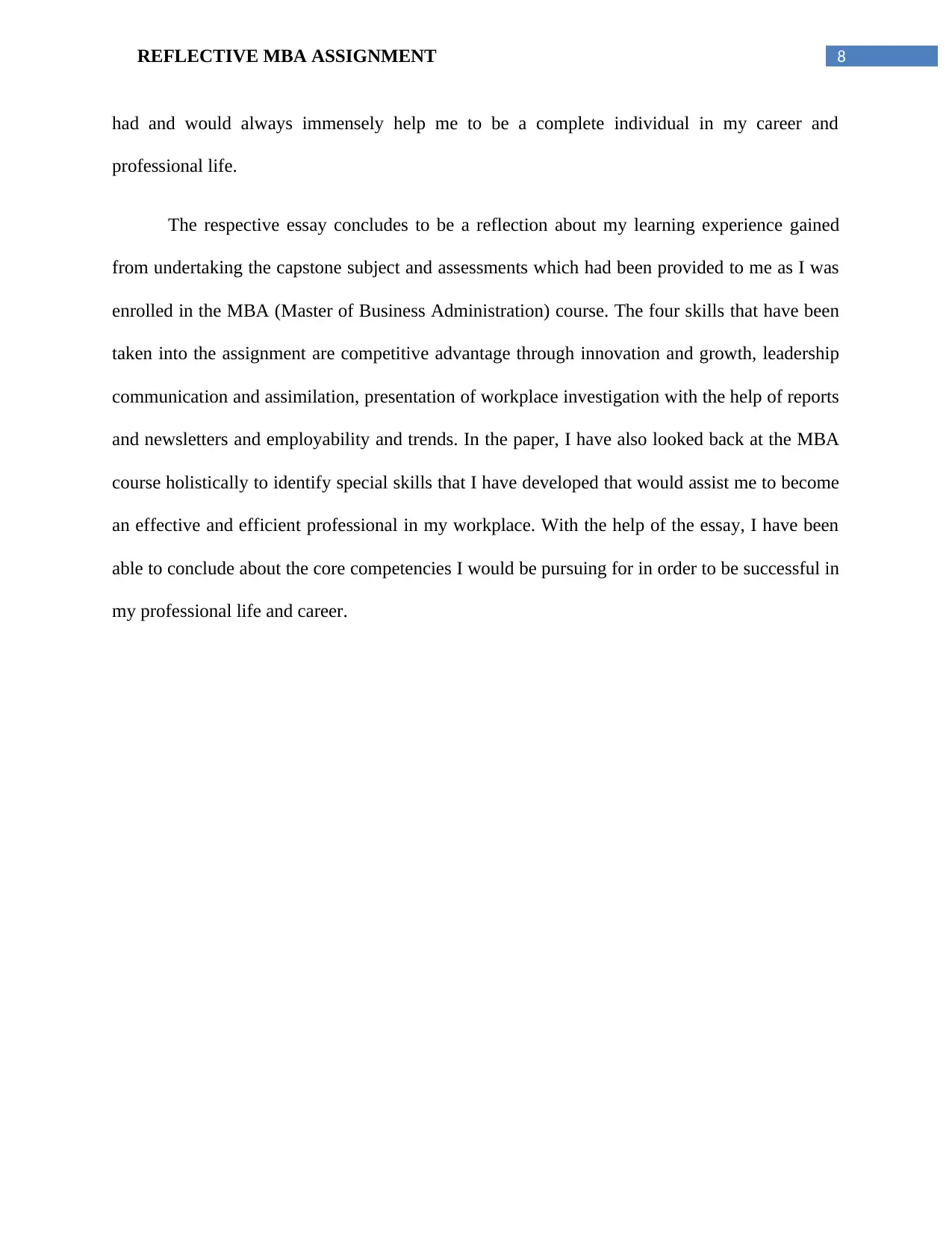
8REFLECTIVE MBA ASSIGNMENT
had and would always immensely help me to be a complete individual in my career and
professional life.
The respective essay concludes to be a reflection about my learning experience gained
from undertaking the capstone subject and assessments which had been provided to me as I was
enrolled in the MBA (Master of Business Administration) course. The four skills that have been
taken into the assignment are competitive advantage through innovation and growth, leadership
communication and assimilation, presentation of workplace investigation with the help of reports
and newsletters and employability and trends. In the paper, I have also looked back at the MBA
course holistically to identify special skills that I have developed that would assist me to become
an effective and efficient professional in my workplace. With the help of the essay, I have been
able to conclude about the core competencies I would be pursuing for in order to be successful in
my professional life and career.
had and would always immensely help me to be a complete individual in my career and
professional life.
The respective essay concludes to be a reflection about my learning experience gained
from undertaking the capstone subject and assessments which had been provided to me as I was
enrolled in the MBA (Master of Business Administration) course. The four skills that have been
taken into the assignment are competitive advantage through innovation and growth, leadership
communication and assimilation, presentation of workplace investigation with the help of reports
and newsletters and employability and trends. In the paper, I have also looked back at the MBA
course holistically to identify special skills that I have developed that would assist me to become
an effective and efficient professional in my workplace. With the help of the essay, I have been
able to conclude about the core competencies I would be pursuing for in order to be successful in
my professional life and career.
⊘ This is a preview!⊘
Do you want full access?
Subscribe today to unlock all pages.

Trusted by 1+ million students worldwide
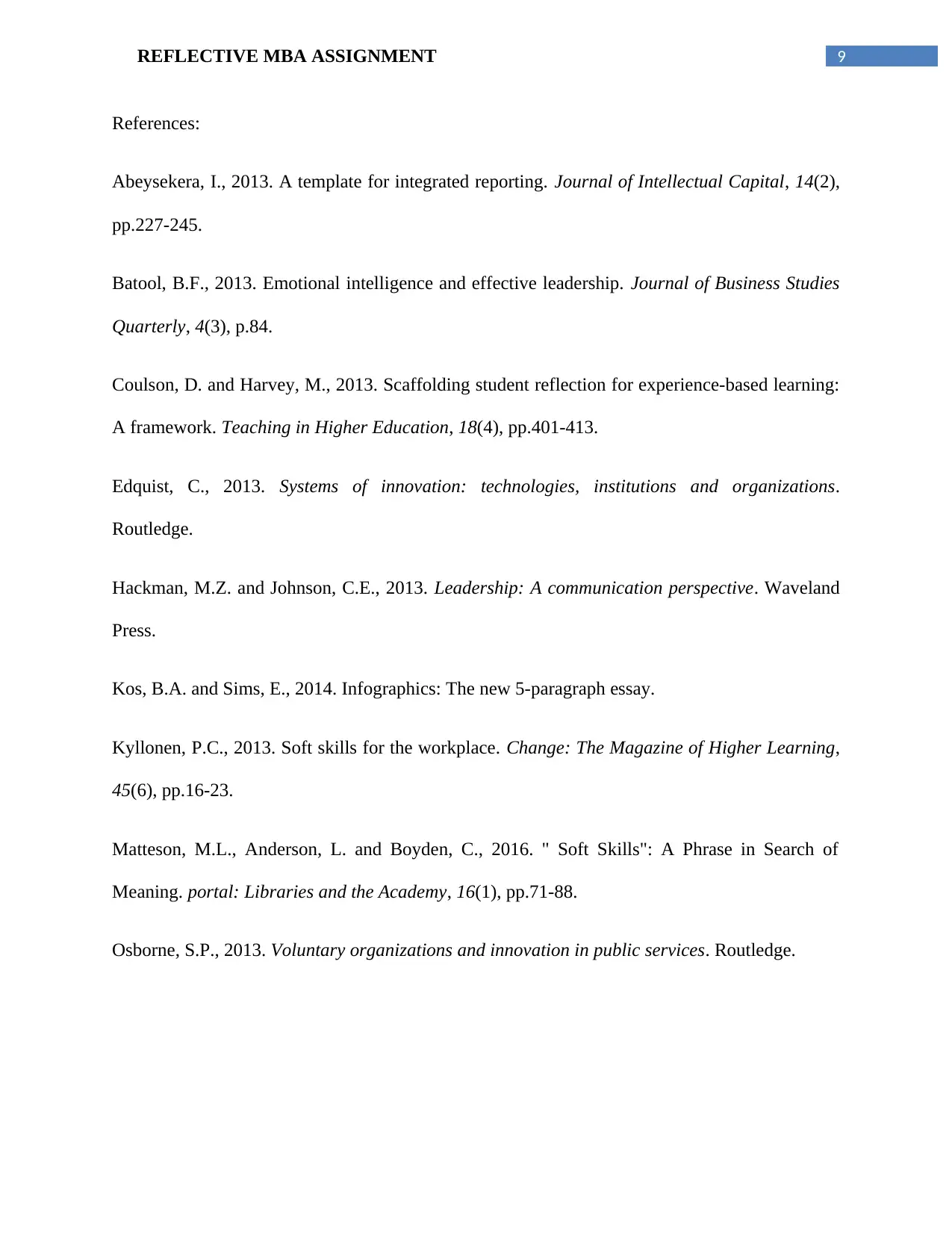
9REFLECTIVE MBA ASSIGNMENT
References:
Abeysekera, I., 2013. A template for integrated reporting. Journal of Intellectual Capital, 14(2),
pp.227-245.
Batool, B.F., 2013. Emotional intelligence and effective leadership. Journal of Business Studies
Quarterly, 4(3), p.84.
Coulson, D. and Harvey, M., 2013. Scaffolding student reflection for experience-based learning:
A framework. Teaching in Higher Education, 18(4), pp.401-413.
Edquist, C., 2013. Systems of innovation: technologies, institutions and organizations.
Routledge.
Hackman, M.Z. and Johnson, C.E., 2013. Leadership: A communication perspective. Waveland
Press.
Kos, B.A. and Sims, E., 2014. Infographics: The new 5-paragraph essay.
Kyllonen, P.C., 2013. Soft skills for the workplace. Change: The Magazine of Higher Learning,
45(6), pp.16-23.
Matteson, M.L., Anderson, L. and Boyden, C., 2016. " Soft Skills": A Phrase in Search of
Meaning. portal: Libraries and the Academy, 16(1), pp.71-88.
Osborne, S.P., 2013. Voluntary organizations and innovation in public services. Routledge.
References:
Abeysekera, I., 2013. A template for integrated reporting. Journal of Intellectual Capital, 14(2),
pp.227-245.
Batool, B.F., 2013. Emotional intelligence and effective leadership. Journal of Business Studies
Quarterly, 4(3), p.84.
Coulson, D. and Harvey, M., 2013. Scaffolding student reflection for experience-based learning:
A framework. Teaching in Higher Education, 18(4), pp.401-413.
Edquist, C., 2013. Systems of innovation: technologies, institutions and organizations.
Routledge.
Hackman, M.Z. and Johnson, C.E., 2013. Leadership: A communication perspective. Waveland
Press.
Kos, B.A. and Sims, E., 2014. Infographics: The new 5-paragraph essay.
Kyllonen, P.C., 2013. Soft skills for the workplace. Change: The Magazine of Higher Learning,
45(6), pp.16-23.
Matteson, M.L., Anderson, L. and Boyden, C., 2016. " Soft Skills": A Phrase in Search of
Meaning. portal: Libraries and the Academy, 16(1), pp.71-88.
Osborne, S.P., 2013. Voluntary organizations and innovation in public services. Routledge.
1 out of 10
Related Documents
Your All-in-One AI-Powered Toolkit for Academic Success.
+13062052269
info@desklib.com
Available 24*7 on WhatsApp / Email
![[object Object]](/_next/static/media/star-bottom.7253800d.svg)
Unlock your academic potential
Copyright © 2020–2026 A2Z Services. All Rights Reserved. Developed and managed by ZUCOL.



